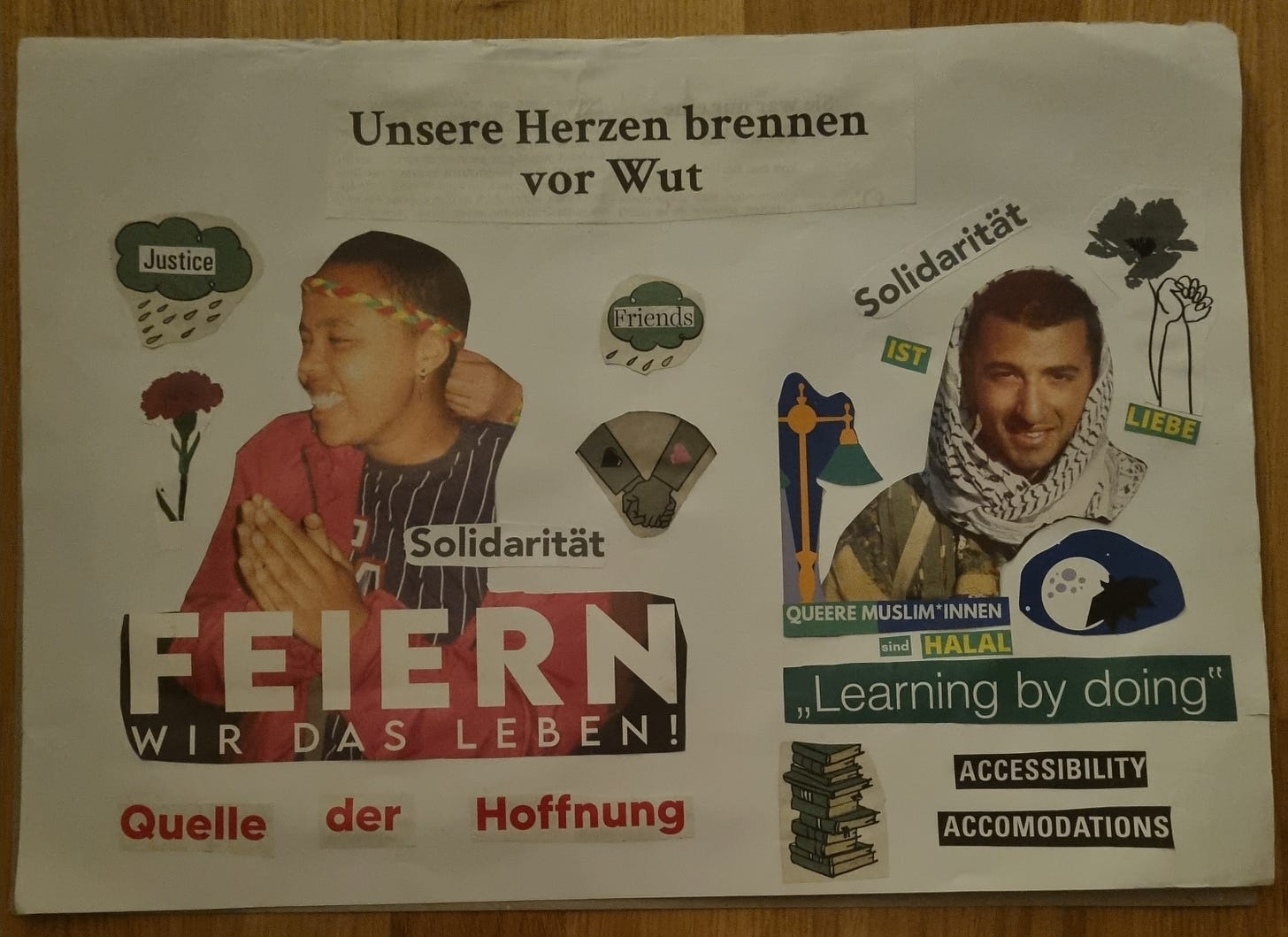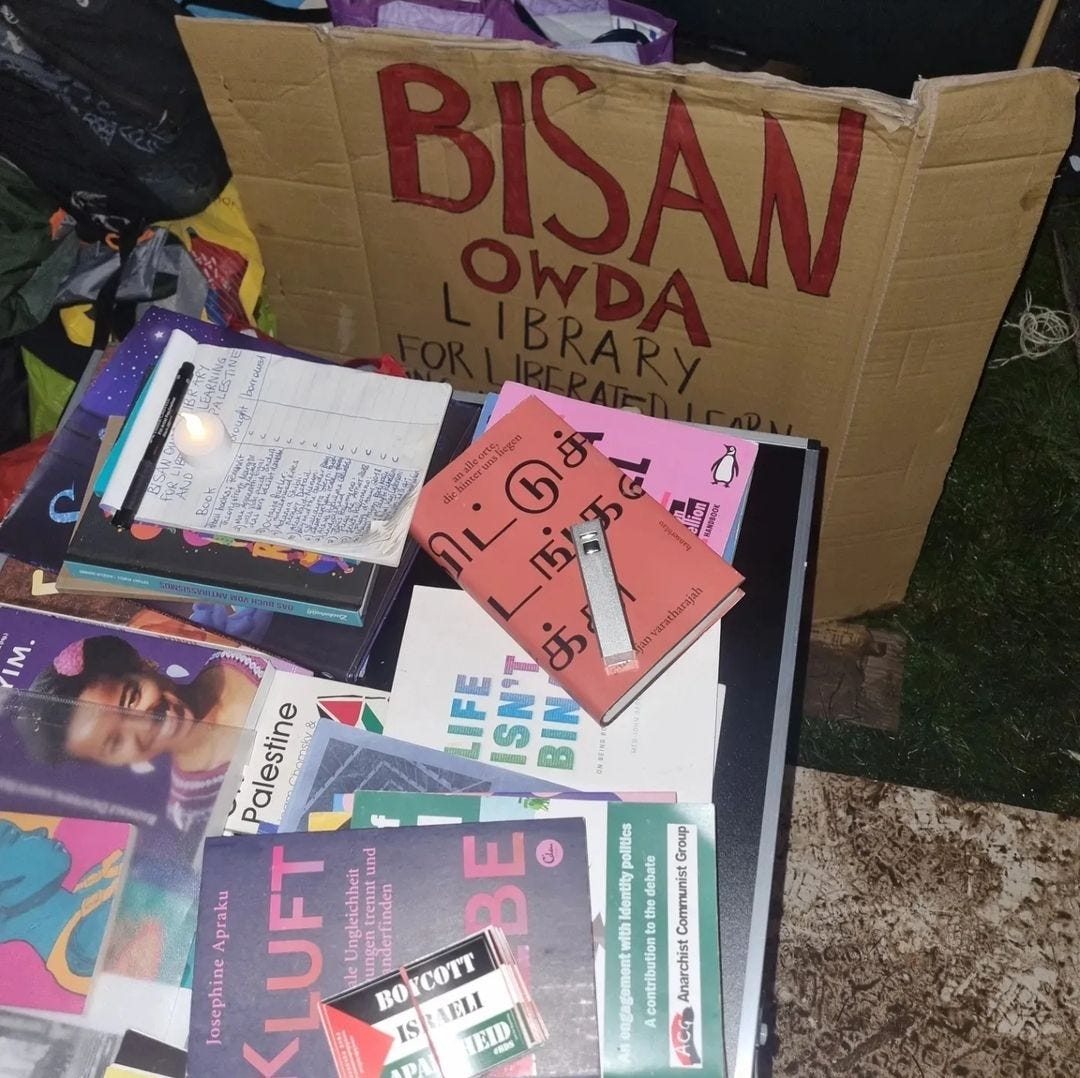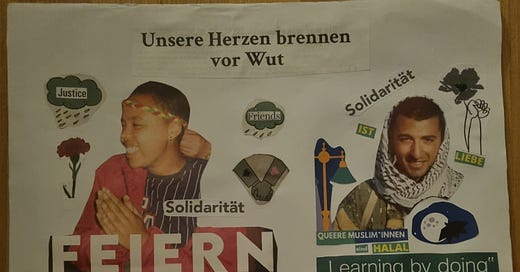
Dear Prof. [insert whomever this applies to],
I am a little exhausted but also grateful for the confrontation on Monday. I find nothing worse than silence. In a confrontation, at least a learning process is possible.
For me, one thing is very clear: I want to be part of the change. I am not studying comparative literature at the University of Vienna for my own "career", but I want other BIPOC (students) to have an easier time in the future. This includes my Palestinian, Lebanese and generally Arab friends.
I know why I'm here. I'm not here to be "right". I don't need external validation of whether what I'm doing is right or wrong. My conscience and my intuition have been letting me know the difference for a long time and the way the University of Vienna remains silent about Israel's crimes is not right.
Deep down, you probably know this too. You seem like a very committed professor to me. What do you think we can learn about Israel from 19841? What do you think George Orwell warned about? Doesn't it seem dangerous to you if we are not allowed to talk about a country's war crimes? Do you really think that authors have no political interests, even if they claim to be "neutral"? Do you think it makes no difference whether Palestinian literature that is critical of the founding of the State of Israel is being read or only Israeli literature that idealizes the State of Israel?
I could report what happened on Monday to the anti-racism office. Your statement regarding my being out of place in comparative literature is discriminatory. It creates insecurity for me. Do I have to be constantly on guard in your lecture now? Will you grade me fairly? Was all my work so far for nothing? Do I now have to do the whole lecture again with someone else? Will I find the same attitude towards Israel there?
I would like an apology but I am not dependent on it. My life goes on. My learning goes on. I really value knowledge outside of universities. The knowledge of "simple", complex people who don't necessarily have a university degree. Sadly, knowledge and learning processes outside of universities are often much more critical than inside. Why is that?
I have no interest in taking revenge, teaching you a lesson or "winning". I full-heartedly don't care about any of that. I don't think you're a bad person. On the contrary but good people can also make mistakes and make life difficult for others.
I would like for us to be able to talk openly about Israel's war crimes. I would like your solidarity. I would like another ally who, instead of making my life even more difficult than it already is as a Black student, has the courage to stand up for my rights and those of other BIPOC students. You have influence. You could really make a difference. You could be open to constructive criticism. You could break the silence.
Think about it.
Until Monday,
Imọlẹ
PS: If I don't show up, it's probably because I'm sick and exhausted. Racism is traumatizing and I have chronic pain related to my racism trauma. It causes sleep disorders, depression, suicidal thoughts. The fear about the future and the fear of whether people I care about in Palestine will survive tomorrow or of hearing news of their death2 at any time are stressful. I have been living with this constant fear for over a year. Like everyone else, I want the suffering to stop, but continuing to invest in Israeli universities that research military strategies and continuing to send weapons to Israel will not solve this. In order for the apartheid regime in South Africa to end, there had to be consequences for the regime. The politics of a country affect everyone and everything, yes, even art. Not seeing that is a (white) privilege.
PPS: Thank you to my allies for showing me your compassion and understanding!
We watched the play of Orwell’s book 1984 as a part of this lecture.
I have a deep parasocial relationship to the journalist Bisan Owda. We have never met but hearing of her death would probably spiral me into deep grief. I consider her a friend. That’s my specialty as an autistisc person. Imaginary friendships are something I’ve cultivated from a very early age. It keeps me alive. May all Palestinians live on!

I recently wrote this statement to more clearly define what I stand for:
Mixed Magic is for you, if you are a compassionate, sensitive and non-judgmental soul. It's for you, if you're not a black-and-white thinker, if you can hold multiple truths and embrace paradoxes. If you're in solidarity with marginalized and oppressed groups, it's for you, no matter which identities you hold. If you're someone who doesn't want to see other people's downfall but rather lift each other up and gently support each other in our learning journeys, if you honor that mistakes are a beautiful and necessary part of any journey, if you love poetry, storytelling and music and you don't see art as a "weak” form of resistance, if you are a dreamer, if you love transformative and healing approaches to justice, if you don't uphold grind culture and “needing to be strong”, if you just wanna rest without guilt, guess what? It's SO for you. I'm SO here for that. Mixed Magic is for you if at the end of the day, no matter how cruel the world gets, you'd choose love. ❤️
I genuinely don’t care if people think I’m too compassionate, too loving, too kind “to the enemy”, too soft — those are core traits of who I am but also values that I hold and I also have a lot of lived experience around what leads people who were previously way more conservative to actually change. Judging others, portraying yourself as morally superior and so on, doesn’t. The truth is that we cannot change other people but when we empower ourselves and heal our wounds, we might become so inspiring that “we make revolution irresistible”. According to Toni Cade Bambara: This is the role of the artist.



